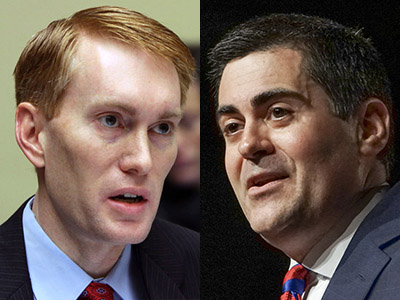 [1]
[1]WASHINGTON (BP) — Two Southern Baptists — one a U.S. senator and the other a convention entity head — said on Religious Freedom Day the idea of “separation of church and state” entails freedom — rather than limitations — to Americans in the practice of their faith.
 Sen. James Lankford, R-Okla., and Russell Moore, president of the Ethics & Religious Liberty Commission, co-wrote “The Real Meaning of the Separation of Church and State” for the celebration Tuesday (Jan. 16) of the country’s heritage of religious freedom. Time magazine published the article online.
Sen. James Lankford, R-Okla., and Russell Moore, president of the Ethics & Religious Liberty Commission, co-wrote “The Real Meaning of the Separation of Church and State” for the celebration Tuesday (Jan. 16) of the country’s heritage of religious freedom. Time magazine published the article online.
President Trump declared Jan. 16 as Religious Freedom Day, saying in the proclamation that religious free exercise “is a source of personal and national stability, and its preservation is essential to protecting human dignity.”
In their article, Lankford and Moore said people sometimes have used “separation of church and state” to mean religious faith should not be brought into the public square.
Instead, they wrote, “The concept of a ‘separation of church and state’ reinforces the legal right of a free people to freely live their faith, even in public; without fear of government coercion. Free exercise means you may have a faith and you may live it.”
Congress established Religious Freedom Day on Jan. 16 because the Virginia General Assembly approved the Statute for Religious Freedom on that date in 1786. The law, written by Thomas Jefferson, is considered the forerunner of the First Amendment’s establishment of religion and free exercise of religion clauses.
The Virginia law “affirmed what we should recognize in every era: the right to practice any faith, or to have no faith, is a foundational freedom for all Americans,” Lankford and Moore wrote. “This right is also behind what Jefferson meant when he spoke of a ‘wall of separation’ between the church and the state.”
Jefferson used the phrase “wall of separation” in an 1801 letter to Connecticut Baptists who were concerned about their religious freedom, Lankford and Moore point out. In his letter, Jefferson told the Baptists that religious liberty “would be a key part of the American vision,” Lankford and Moore said. In explaining the establishment and free exercise clauses in the letter, Jefferson said the two built a “wall of separation of church and state.”
“Jefferson was not suggesting that religious people or religious motivations should be exiled from public debate,” Lankford and Moore wrote. “As a matter of fact, the [Baptists’] letter was from a religious people appealing to an elected official for their rights — an elected official who, by the way, attended church services during his administration inside the United States Capitol.”
The U.S. government, unlike many in the world, “is not prohibited from referencing or accommodating religion, nor is the government compelled to scrub all religious references from the public square,” they said. “Rather, the First Amendment ensures both that the government does not show preference to a certain religion and that the government does not take away an individual’s ability to exercise religion.”
This means, Lankford and Moore wrote, “the church should not rule over the state, and the state cannot rule over the church. Religion is too important to be a government program or a political pageant.”
Lankford and Moore cited recent Supreme Court opinions that have affirmed this understanding of the First Amendment.
The high court’s 2014 decision in Town of Greece v. Galloway, they wrote, held “it is an elemental First Amendment principle that government may not coerce its citizens to support or participate in any religion or its exercise.”
Last year in Trinity Lutheran Church v. Comer, they said, the justices ruled that “denying a generally available benefit solely on account of religious identity imposes a penalty on the free exercise of religion…. The exclusion of Trinity Lutheran from a public benefit for which it is otherwise qualified, solely because it is a church, is odious to our Constitution all the same, and cannot stand.”
Those opinions affirmed “separation of church and state,” Lankford and Moore wrote.
“Separation of church and state doesn’t shut down our debates over religion in the public square; it guarantees the freedom for us to respectfully have those debates.”
